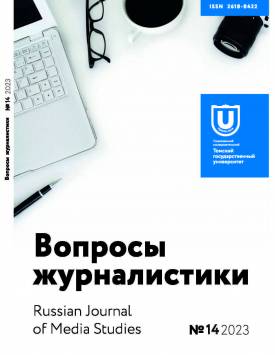Little Golden America by Ilya Ilf and Yevgeny Petrov: Axiology of the 1930s Soviet journalism in translation
The article considers the markers of the 1930s Soviet journalism value scale on the material of the travel essay One-Storied America by Ilya Ilf and Yevgeny Petrov and its English translation Little Golden America made by Charles Malamuth. Precedent proper names, names of cultural realities, religious confessions, ideological cliches are the markers of axiogenic situations. The essay is of interest in the aspect of linguistic praxeology and axiological linguistics: it clearly expresses the markers of the value scale of Soviet journalism in the 1930s, set in the identification coordinates of “friends” and “strangers”. The article interprets adaptive translation strategies (explanatory translation, “reconstruction” of the English-language shape of a word, omission of information, compensation), which Charles Malamuth used while transferring into English precedent names and realities of Soviet culture, through which two famous Soviet journalists during their travel in 1935-36 tried to appreciate the semiosphere of other cultures. The communicative situations described from the point of view of the narrators in the analyzed travel essay reflect the values and standards of a certain society. These values and standards can be divided into four groups: basic values of physical existence, utilitarian values, moral values, and terminal values. The axiogenic situations of intercultural communication that arose when creating the text of the original essay by Ilf and Petrov did not always coincide with the axiogenic situations actualized when translating this essay into English. The axiological standard for the narrators of the source text is the moral and utilitarian values of the Soviet people, which differ significantly from Western values. The uniqueness and exclusivity of the Soviet people as a value is postulated. The axiological standard for the translator as a person sharing a different culture is the values of an emerging politically correct journalistic discourse, in connection with which the Soviet journalists’ irony aimed at ridiculing terminal (in particular, religious) values is significantly softened, and “politically incorrect” segments of the source text are eliminated in translation. The markers of the axiological scale in both the source and target texts are precedent proper names (anthroponyms and toponyms), names of cultural realities, religious confessions, ideologemes. Focusing on the regulatory and praxeological standards of the English-speaking audience, the translator of the essay, Charles Malamuth, corrects this “axiological matrix” in accordance with the praxeology of politically correct journalistic discourse. The author declares no conflicts of interests.
Keywords
Soviet journalism, axiological linguistics, axiogenic situations, One-Storied America, Little Golden AmericaAuthors
| Name | Organization | |
| Karpukhina Viktoriya N. | Altai State University | vkarpuhina@yandex.ru |
References

Little Golden America by Ilya Ilf and Yevgeny Petrov: Axiology of the 1930s Soviet journalism in translation | Voprosy zhurnalistiki – Russian Journal of Media Studies. 2023. № 14. DOI: 10.17223/26188422/14/5
